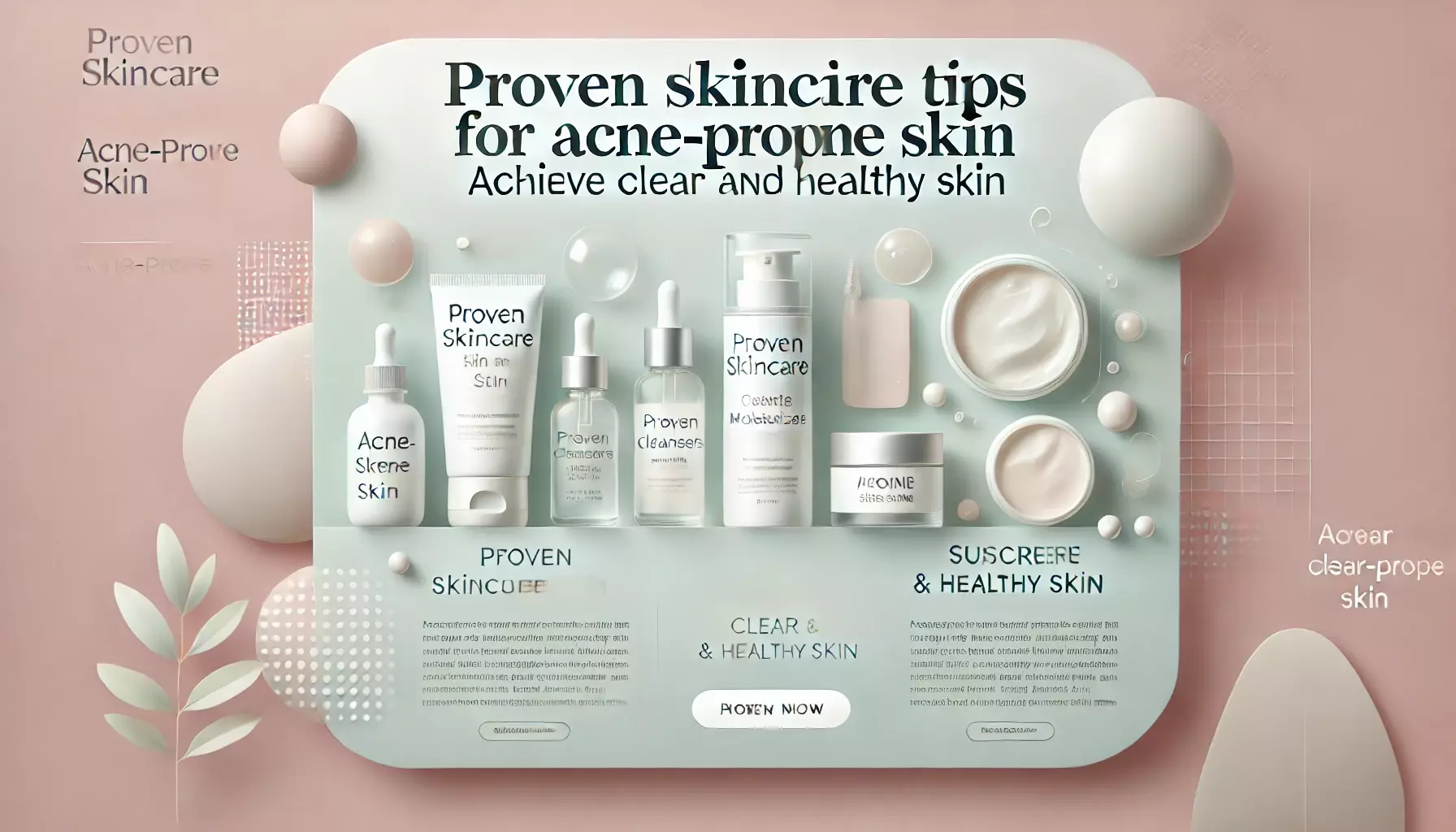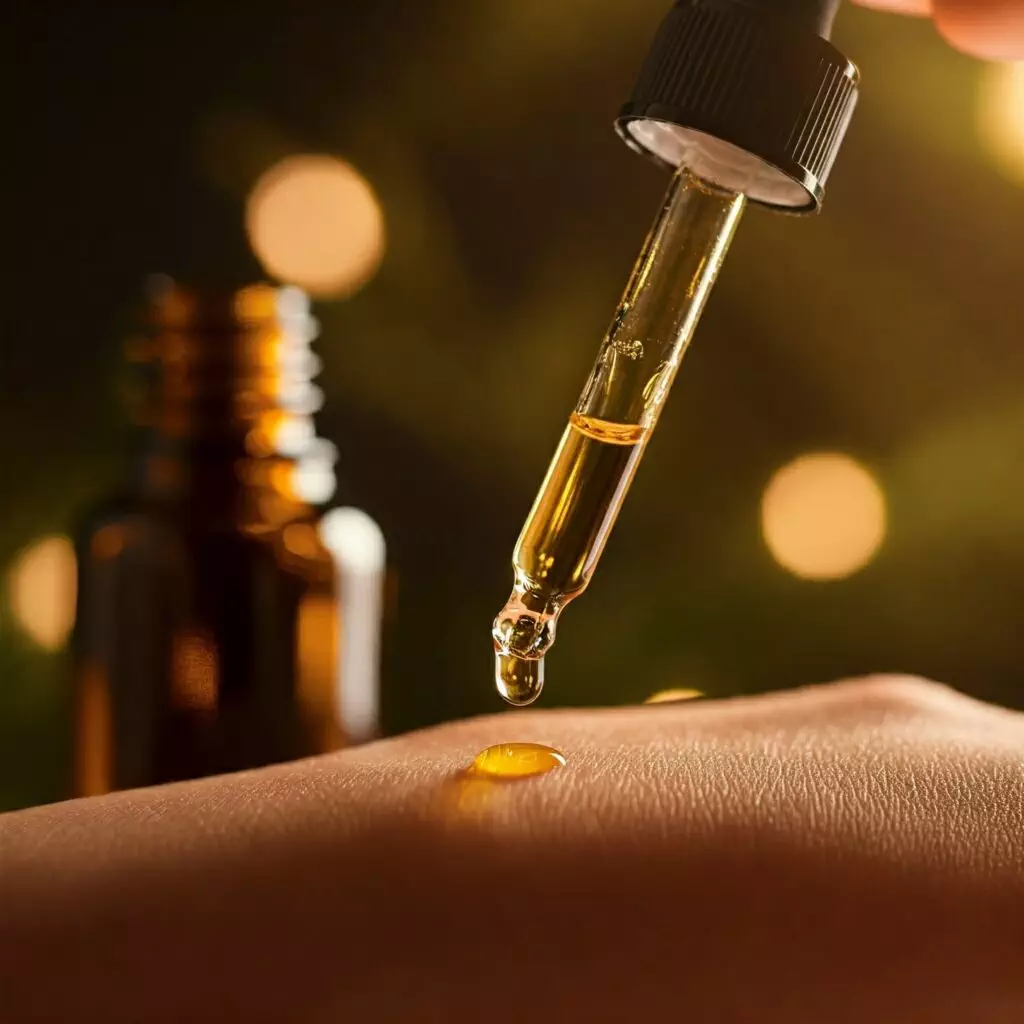Proven Skincare Tips for Acne-Prone Skin
Achieving clear, healthy skin can be a challenge, especially for those with acne-prone skin. However, a well-rounded skincare routine, rooted in proven methods, can greatly reduce the frequency and severity of breakouts. In this comprehensive guide, we provide evidence-based skincare tips designed specifically for acne-prone skin.
Understanding Acne-Prone Skin
Acne occurs when hair follicles become clogged with oil and dead skin cells, leading to inflammation, pimples, blackheads, or cysts. Hormones, genetics, and environmental factors can exacerbate acne. For individuals with acne-prone skin, it’s essential to understand these contributing factors to effectively manage and treat breakouts.
The best way to manage acne is through a consistent skincare routine that targets the root causes of breakouts. Below are proven, actionable skincare tips for acne-prone skin based on clinical research.

1. Gentle Cleansing for Acne-Prone Skin
Maintaining a clean face is critical to preventing breakouts, but harsh cleansers can strip the skin of essential moisture, leading to irritation and increased oil production. Opt for gentle cleansers that target acne without over-drying the skin.
Key Tips:
- Choose a cleanser with salicylic acid or benzoyl peroxide. These ingredients are known to penetrate pores and reduce acne by eliminating excess oil and dead skin cells. Products containing these active ingredients are available over the counter and recommended by dermatologists. According to the National Institutes of Health, salicylic acid is a safe and effective ingredient for treating acne [source].
- Wash your face twice daily. Over-cleansing can aggravate the skin, so stick to a morning and evening routine.
- Use lukewarm water to avoid skin irritation.
- Pat dry with a clean, soft towel. Never rub your skin harshly, as this can cause further irritation.
2. Incorporate Exfoliation to Unclog Pores
Exfoliation is essential for acne-prone skin to remove dead skin cells and prevent clogged pores, which often lead to breakouts. However, it’s crucial to avoid over-exfoliation, which can cause irritation and worsen acne.
Key Tips:
- Use a chemical exfoliant like alpha hydroxy acids (AHAs) or beta hydroxy acids (BHAs) instead of physical scrubs. BHAs, such as salicylic acid, are especially effective for acne-prone skin as they can penetrate deep into the pores [source].
- Exfoliate 1-2 times a week to avoid irritation.
- Avoid abrasive scrubs, as they can damage the skin barrier and worsen acne.
3. Moisturize Regularly with Non-Comedogenic Products
Many individuals with acne-prone skin avoid moisturizers due to the fear of clogging pores. However, skipping this step can actually make acne worse, as the skin may overproduce oil to compensate for dryness.
Key Tips:
- Choose a lightweight, oil-free, non-comedogenic moisturizer. Look for products labeled “non-comedogenic,” meaning they won’t clog pores.
- Use a gel-based or water-based moisturizer if you have oily skin.
- Hyaluronic acid-based moisturizers provide hydration without adding oil to the skin. Hyaluronic acid helps retain moisture and is recommended for acne-prone skin by leading dermatologists [source].
4. Topical Treatments for Acne-Prone Skin
Several over-the-counter and prescription treatments are proven to effectively treat acne. These treatments focus on reducing inflammation, killing acne-causing bacteria, and preventing clogged pores.
Key Tips:
- Benzoyl peroxide: Known to reduce bacteria and inflammation, benzoyl peroxide is one of the most effective acne treatments. Use a product with 2.5-5% concentration for the best results without causing excessive dryness.
- Retinoids: These vitamin A derivatives are effective in reducing acne by promoting cell turnover and preventing pores from becoming clogged. Retinoids are available in both prescription and over-the-counter forms. According to the American Academy of Dermatology, retinoids are considered the first-line treatment for acne [source].
- Niacinamide: This anti-inflammatory ingredient helps soothe redness and irritation associated with acne.
- Tea tree oil: A natural alternative to traditional acne treatments, tea tree oil has antimicrobial properties and can reduce inflammation.
5. Sun Protection is a Must
Protecting your skin from the sun is crucial, especially for individuals using acne treatments like retinoids, which can make the skin more sensitive to UV damage. Sun exposure can worsen acne scarring and cause pigmentation issues.
Key Tips:
- Choose a broad-spectrum sunscreen with at least SPF 30. Opt for non-comedogenic sunscreens that won’t clog pores.
- Look for sunscreens containing zinc oxide or titanium dioxide, as these are less likely to cause breakouts.
- Apply sunscreen daily, even on cloudy days or indoors if you’re near windows.
6. Dietary Considerations for Acne-Prone Skin
Diet plays a role in acne management, though the connection between diet and acne is still being researched. Certain foods may trigger breakouts in some individuals, while others may support skin health.
Key Tips:
- Limit dairy intake. Some studies suggest that dairy, particularly skim milk, may contribute to acne [source].
- Reduce sugar and high-glycemic foods. A diet high in processed carbohydrates and sugars can cause spikes in blood sugar levels, potentially leading to increased oil production and acne flare-ups [source].
- Include omega-3 fatty acids. Foods rich in omega-3s, like fish and flaxseeds, can reduce inflammation and promote healthier skin.
7. Maintain Proper Hydration
Drinking enough water is vital for overall skin health. Proper hydration helps flush out toxins, maintain skin elasticity, and prevent excess oil production, which can lead to acne.
Key Tips:
- Aim for at least eight glasses of water a day to keep your skin hydrated.
- Hydration helps balance oil production, which is essential for individuals with acne-prone skin.
8. Don’t Pick or Squeeze Pimples
While it may be tempting, picking or squeezing pimples can lead to scarring and worsen acne by introducing bacteria into the skin.
Key Tips:
- Avoid touching your face throughout the day.
- If you need to address a particularly stubborn pimple, consider using a hydrocolloid patch. These patches can help heal acne faster and prevent bacteria from entering the pores [source].
9. Adopt a Stress-Management Routine
Stress is a known trigger for acne. High levels of stress can lead to increased oil production, contributing to breakouts.
Key Tips:
- Practice mindfulness techniques such as meditation or yoga to manage stress.
- Engage in regular exercise, as it can help lower stress levels and promote healthier skin.
- Ensure you’re getting enough sleep, as poor sleep patterns can increase stress and worsen acne.
10. Consult with a Dermatologist for Persistent Acne
If over-the-counter treatments are not working or if your acne is severe, consult with a board-certified dermatologist. They can prescribe stronger medications and provide personalized recommendations based on your skin type and acne severity.
Key Tips:
- Prescription treatments such as oral antibiotics, hormonal treatments (for women), and stronger topical treatments may be necessary for managing more severe cases of acne.
- Dermatologists can also perform procedures like chemical peels, extractions, or laser treatments to help reduce acne and scarring [source].
Conclusion: Consistency is Key for Acne-Prone Skin
Managing acne-prone skin requires a combination of the right skincare products, lifestyle adjustments, and consistency. Implementing the tips outlined above can help reduce breakouts and improve overall skin health. Always remember that patience is essential when following an acne skincare routine; results take time, but with persistence, you can achieve clearer skin.
For more detailed guidance on acne treatments, visit reputable sources such as the National Institute of Arthritis and Musculoskeletal and Skin Diseases [source] or the American Academy of Dermatology [source]
FAQs for Proven Skincare Tips for Acne-Prone Skin
1. What is the best skincare routine for acne-prone skin?
The best skincare routine for acne-prone skin includes gentle cleansing with a salicylic acid or benzoyl peroxide cleanser, regular exfoliation, and moisturizing with a non-comedogenic product. Incorporating acne-fighting ingredients like benzoyl peroxide, retinoids, and niacinamide can further help control breakouts. Always finish with a broad-spectrum sunscreen during the day.
2. How often should I exfoliate acne-prone skin?
For acne-prone skin, it’s best to exfoliate 1-2 times a week with a chemical exfoliant, such as salicylic acid (a beta hydroxy acid), which helps to unclog pores without irritating the skin. Avoid using harsh physical scrubs as they can exacerbate acne.
3. Can moisturizers cause acne?
Moisturizers do not cause acne if you use a non-comedogenic, oil-free formula. Skipping a moisturizer can lead to dryness and increased oil production, which may worsen acne. Look for gel-based or water-based moisturizers designed specifically for acne-prone skin.
4. Which ingredients should I look for in acne treatments?
Key ingredients to look for in acne treatments include salicylic acid, benzoyl peroxide, retinoids, and niacinamide. Salicylic acid unclogs pores, while benzoyl peroxide kills acne-causing bacteria. Retinoids promote cell turnover, and niacinamide reduces inflammation.
5. Does diet affect acne?
Diet may affect acne in some individuals. High-glycemic foods (e.g., sugar and processed carbs) and dairy, particularly skim milk, have been linked to increased acne breakouts in some studies. Eating a balanced diet rich in omega-3 fatty acids may help reduce inflammation and improve skin health.
6. Is it safe to use sunscreen on acne-prone skin?
Yes, it is essential to use sunscreen on acne-prone skin. Opt for a non-comedogenic, broad-spectrum sunscreen with at least SPF 30. Sunscreens containing zinc oxide or titanium dioxide are less likely to clog pores and can protect your skin from sun damage.
7. How can stress affect acne?
Stress can trigger hormonal changes that increase oil production and lead to acne flare-ups. Managing stress through techniques like meditation, regular exercise, and adequate sleep can help reduce breakouts.
8. When should I see a dermatologist for acne?
If over-the-counter treatments are not improving your acne or if your acne is severe, it is advisable to see a dermatologist. A dermatologist can provide personalized treatment options, such as prescription medications or procedures like chemical peels and laser therapy.


